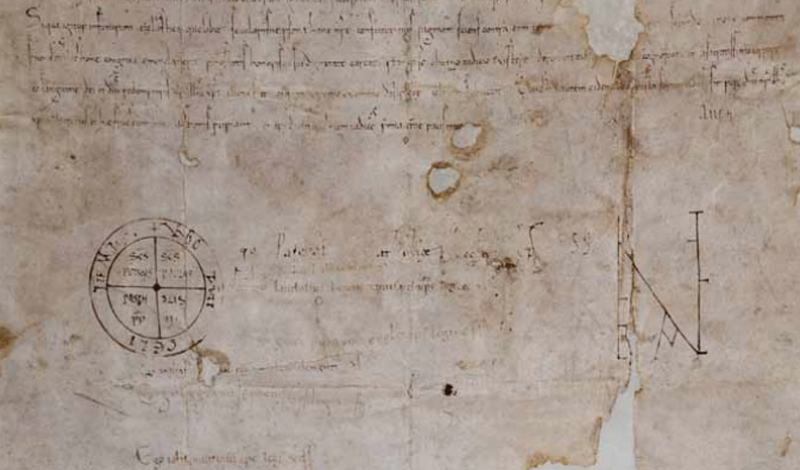
Dziewięćset lat od uznania Zakonu przez papieża Paschalisa II
W lutym 2013 roku i przez cały ten rok Suwerenny Zakon Maltański obchodził wyjątkowy jubileusz. Minęło dokładnie 900 lat od chwili, gdy papież Paschalis II ogłosił Uroczysty Przywilej w 1113 roku, oficjalnie uznając wspólnotę monastyczną Szpitalników św. Jana Jerozolimskiego.
Dokument ten, określany od pierwszych słów swojego tekstu Pie Postulatio Voluntatis, ustanowił podstawę prawną suwerenności i niezależności Zakonu św. Jana Jerozolimskiego, znanego dziś jako Suwerenny Zakon Maltański, i był kluczowym elementem jego rozwoju.
Założony w Ziemi Świętej ponad pół wieku wcześniej jako wspólnota monastyczna opiekująca się ubogimi pielgrzymami w szpitalu w Jerozolimie, dzięki temu uroczystemu przywilejowi Szpitalnicy św. Jana stali się świeckim zakonem religijnym.
Dokument ten ma również ogromne znaczenie instytucjonalne – papieska bulla uznała bowiem, że Zakon ma pełne prawo zapewnić ciągłość swojej działalności poprzez wybór, we właściwym czasie, następcy swojego założyciela, brata Gerarda.
Pod względem historycznym bulla – obecnie przechowywana w Bibliotece Narodowej Republiki Malty – daje potomnym wyobrażenie o roli i znaczeniu błogosławionego Gerarda, jego osobistej świętości oraz o grupie zakonników profesów, którzy z nim współpracowali. Podkreśla również wagę posługi świadczonej pielgrzymom i ubogim w Jerozolimie.
Lista szpitali i hospicjów istniejących we Francji i we Włoszech kilka dekad po założeniu wspólnoty dowodzi, że instytucja powołana przez brata Gerarda nie ograniczała się do łacińskiego Królestwa Jerozolimskiego, lecz rozwinęła się już w Europie.
W ciągu całego 2013 roku instytucje Suwerennego Zakonu Maltańskiego na pięciu kontynentach obchodziły ten wyjątkowy jubileusz poprzez szereg inicjatyw. Najważniejsze uroczystości miały miejsce 9 lutego 2013 roku w Rzymie, gdzie w Bazylice św. Piotra odprawiono Mszę Świętą pod przewodnictwem kardynała sekretarza stanu Tarcisio Bertone, po której papież Benedykt XVI zwrócił się do ponad 5 000 członków i wolontariuszy Zakonu Maltańskiego, którzy przybyli z całego świata, aby uczestniczyć w tym historycznym jubileuszu.
Uznanie papieskie
W 1113 roku papież Paschalis II oficjalnie uznał wspólnotę monastyczną Szpitalników św. Jana, założoną w Jerozolimie kilkadziesiąt lat wcześniej. Uczynił to dokumentem skierowanym do błogosławionego brata Gerarda, założyciela i pierwszego Wielkiego Mistrza Zakonu. Dokument ten – określany od pierwszych słów tekstu jako Pie Postulatio Voluntatis – był fundamentalnym elementem dla rozwoju Zakonu św. Jana Jerozolimskiego, znanego dziś jako Suwerenny Zakon Maltański.
Poniżej znajduje się tekst przetłumaczony z łaciny na język angielski.
PAPIEŻ PASCHALIS II DO SWEGO CZCIGODNEGO SYNA GERARDA
Paschal, bishop, and servant of such as are the servants of God, to his venerable
son Gerard, founder and Master of the Hospital at Jerusalem, and to his
lawful successors for evermore.
The requests of a devout desire ought to meet with a corresponding fulfillment.
Inasmuch, as of your affection thou hast requested, with regard to the Hospital
which thou hast founded in the city of Jerusalem, in proximity to the Church of
the Blessed John the Baptist, that it should be supported by the authority of
the Apostolic See, and fostered by the patronage of the blessed Apostle Peter:
We, therefore, much pleased with the pious earnestness of your hospitality, do
receive the petition with our paternal favour, and do ordain and establish, by
the authority of this our present decree, that that house of God, your Hospital,
shall now be placed, and shall for ever remain, under the protection of the
Apostolic See, and under that of the Blessed Peter. All things whatsoever,
therefore, which by your preserving care and solicitude have been collected for
the benefit of the said Hospital, for the support and maintenance of pilgrims, or
for relieving the necessities of the poor, whether in the churches of Jerusalem,
or in those of parishes within the limits of other cities; and whatsoever goods
may have been offered already by the faithful, or for the future may through
God’s grace be so offered, or collected by other lawful means; and whatsoever
goods have been, or shall be granted to thee, or to thy successors, or to the
brethren who are occupied in the care and support of pilgrims, by the venerable
brethren the bishops of the diocese of Jerusalem; we hereby decree shall be
retained by you and undiminished.
Moreover, as to the tithes of your revenues, which you collect everywhere at
your own charge, and by your own toil, we do hereby fix and decree, that they
shall be retained by your own Hospital, all opposition on the part of the bishops
and their clergy notwithstanding. We also decree as valid all donations which
have been made to your Hospital by pious princes, either of their tribute moneys
or other donations. We ordain furthermore, that at your death no man shall
be appointed in your place, as chief and master, by any underhand subtlety, or
by violence; but him only who shall, by the inspiration of God, have been duly
elected by the professed brethren of the Institution. Furthermore, all dignities
or possessions which your Hospital at present holds either on this side of the
water, in Asia, or in Europe, as also those which hereafter by God’s bounty it
may obtain; we confirm them to you and to your successors, who shall devote
themselves with pious zeal to the cares of hospitality, and through you to the
said Hospital in perpetuity. We further decree that it shall be unlawful for any
man whatsoever rashly to disturb your Hospital, or to carry off any of its property,
or if carried off to retain possession of it, or to diminish anything from its
revenues, or to harass it with audacious annoyances. But let all its property remain
intact, for the sole use and enjoyment of those for whose maintenance and
support it has been granted. As to the Hospitals or Poor Houses in the Western
provinces, in the Borgo of St.Egidio, Asti, Pisa, Bari, Otranto, Taranto and
Messina, which are distinguished by the title of Hospitals of Jerusalem, we decree
that they shall for ever remain, as they are this day, under the subjection
and disposal of yourself and your successors. If, therefore, at a future time, any
person, whether ecclesiastical or secular, knowing this paragraph of our constitution,
shall attempt to oppose its provisions, and if, after having received a
second or third warning, he shall not make a suitable satisfaction and restitution,
let him be deprived of all his dignities and honours, and let him know that
he stands exposed to the judgment of God, for the iniquity he has perpetrated;
and let him be deprived of the Sacraments of the Body and Blood of Christ, and
of the benefits of the redemption of our Lord, and at the last judgment let him
meet with the severest vengeance. But to all who deal justly and rightly with
the same, on them be the peace of our Lord Jesus Christ, so that not only here
below they may receive the rewards of good actions, but also before the Judge of
all mankind, they may enjoy the blessing of peace eternal.
I Paschal, bishop of the Catholic Church, have signed
I Richard Bishop of Albano, have signed
I Landulphus Archbishop of Benevento, have read and signed
I Canon Bishop of the Church of Preneste, have read and signed
I Anastasio Cardinal priest with the title of Blessed Clement, have signed
I Gregory Bishop of Terracina, have read and signed
I John Bishop of Mellito, have read and signed
I Romuald Cardinal Deacon of the Roman Church, have signed
I Gregorio Cardinal priest of San Crisogono, have read and signed
Dane w Benewencie, ręką Jana, kardynała i bibliotekarza Kościoła Rzymskiego, dnia 15 lutego, w 6. cyklu indykcji od wcielenia naszego Pana, w roku 1113 oraz w 14. roku pontyfikatu papieża Paschalisa II.




